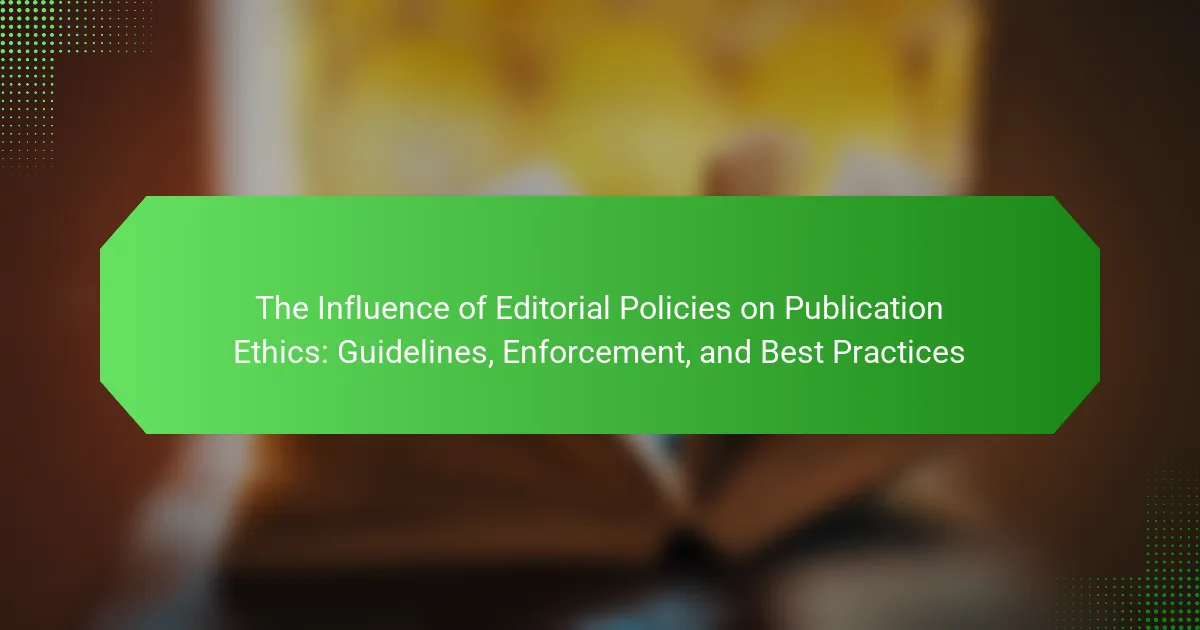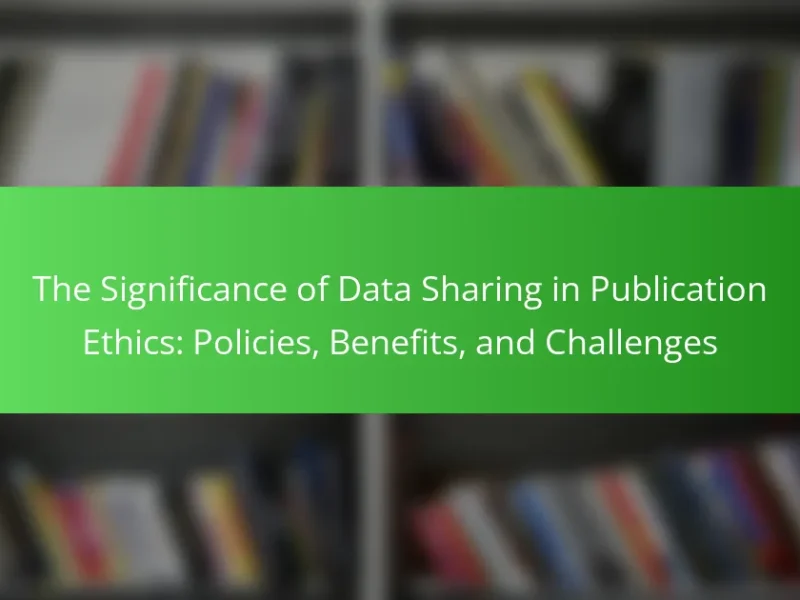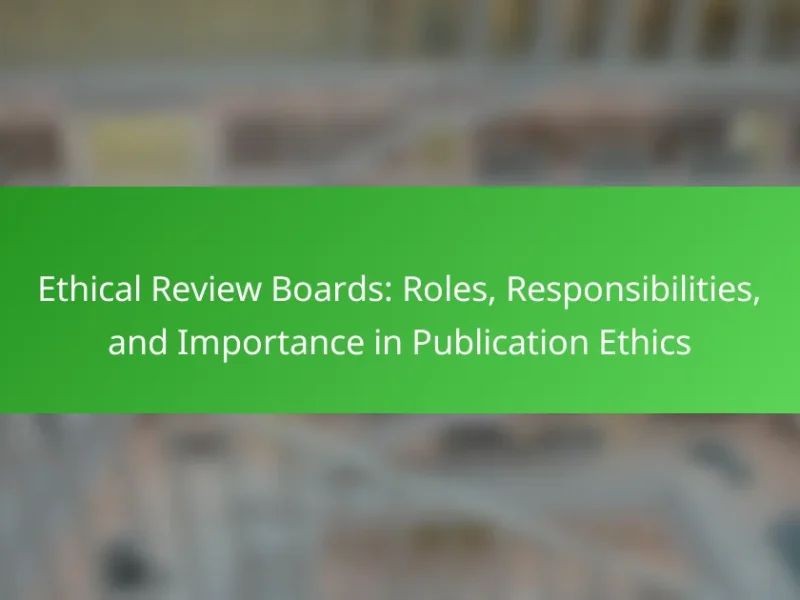Editorial policies are formal guidelines that govern the content and practices of publications, ensuring consistency, quality, and ethical standards throughout the editorial process. This article examines the critical role these policies play in upholding publication ethics by outlining the responsibilities of editors, authors, and reviewers while addressing issues such as plagiarism and conflicts of interest. It further explores the enforcement mechanisms that ensure compliance with these policies, including peer review processes and oversight by editorial boards. Best practices for enhancing editorial policies, such as providing clear guidelines and training for stakeholders, are also discussed to promote a culture of ethical research practices and maintain trust in scholarly communication.
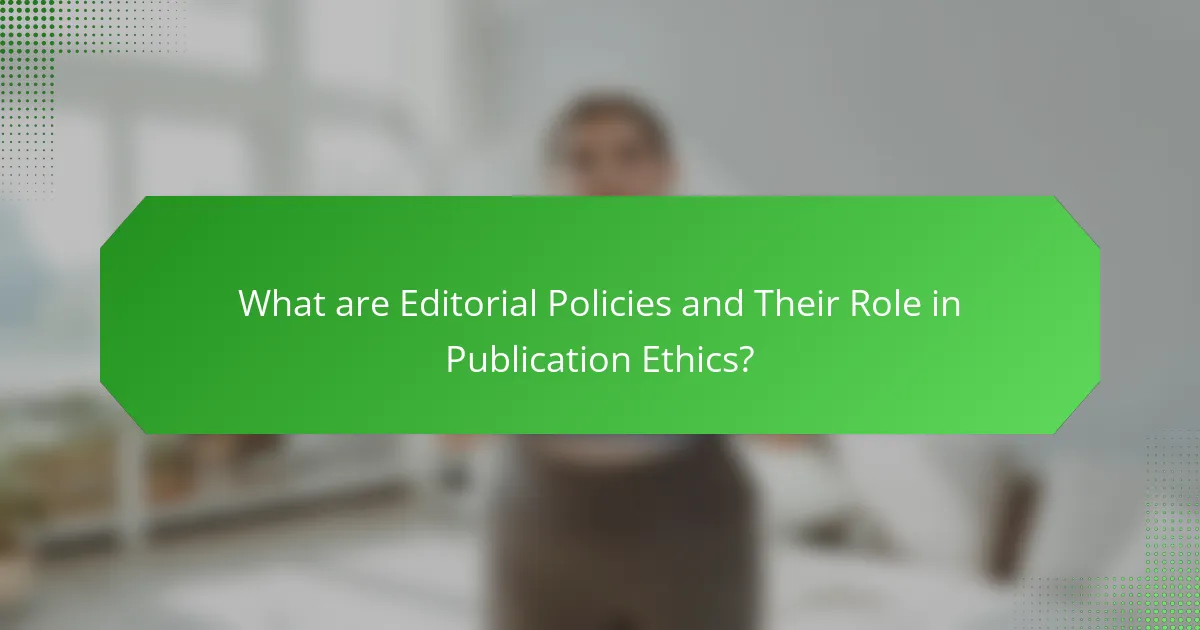
What are Editorial Policies and Their Role in Publication Ethics?
Editorial policies are formal guidelines that govern the content and practices of publications. They ensure consistency, quality, and ethical standards in the editorial process. These policies outline the responsibilities of editors, authors, and reviewers. They also address issues like plagiarism, conflicts of interest, and data integrity. By establishing clear standards, editorial policies promote transparency and accountability in publishing. This helps maintain trust in the scholarly communication process. Studies show that adherence to editorial policies reduces instances of unethical behavior. Thus, editorial policies play a critical role in upholding publication ethics.
How do editorial policies influence ethical standards in publications?
Editorial policies shape ethical standards in publications by establishing clear guidelines for content creation and dissemination. These policies define acceptable practices for authors, editors, and reviewers. They promote transparency, accountability, and integrity in the publication process. For instance, policies on conflict of interest require disclosure, which helps maintain trust with readers. Furthermore, editorial policies often include procedures for addressing misconduct, reinforcing ethical behavior among contributors. Research shows that publications with robust editorial policies experience fewer instances of ethical violations. A study by the Committee on Publication Ethics highlights that adherence to established policies enhances the overall quality and credibility of scholarly work.
What key components define editorial policies?
Key components that define editorial policies include guidelines for content creation, ethical standards, and procedures for conflict resolution. These components ensure consistency in editorial decisions. Content creation guidelines outline the criteria for acceptable topics and writing styles. Ethical standards address issues like plagiarism, authorship, and transparency. Procedures for conflict resolution provide a framework for handling disputes and grievances. Together, these components foster integrity and trust in the publication process.
Why are editorial policies essential for maintaining integrity in publishing?
Editorial policies are essential for maintaining integrity in publishing because they establish clear standards and guidelines for content creation and dissemination. These policies help ensure accuracy, accountability, and ethical behavior among authors, editors, and publishers. They provide a framework for addressing conflicts of interest and managing the peer review process. By enforcing transparency, editorial policies promote trust between publishers and their audiences. Research shows that adherence to robust editorial policies correlates with higher publication quality and credibility. For instance, a study by the Committee on Publication Ethics emphasizes the role of editorial policies in upholding ethical standards in scholarly publishing.
What are the common guidelines established by editorial policies?
Common guidelines established by editorial policies include adherence to ethical standards, transparency in authorship, and rigorous peer review processes. Editorial policies mandate that all authors disclose conflicts of interest. They also emphasize the importance of accurate citation practices to avoid plagiarism. Additionally, guidelines often require the protection of research subjects’ confidentiality. Policies typically advocate for the correction of published errors or retractions when necessary. These guidelines ensure the integrity and credibility of published work.
How do these guidelines ensure transparency in the publication process?
These guidelines ensure transparency in the publication process by establishing clear standards for authors, reviewers, and editors. They outline the responsibilities and ethical considerations for each party involved. This clarity reduces the potential for conflicts of interest. It also promotes accountability among stakeholders in the publication process. Furthermore, guidelines often require disclosure of funding sources and potential biases. This information allows readers to assess the integrity of the published work. By fostering open communication, these guidelines enhance trust in the publication system. Thus, they play a crucial role in maintaining ethical standards in research dissemination.
What types of ethical issues do editorial guidelines address?
Editorial guidelines address various ethical issues in publishing. These issues include plagiarism, which involves using someone else’s work without proper attribution. They also cover conflicts of interest, ensuring transparency when authors or editors have personal stakes in the content. Additionally, guidelines address issues of bias, promoting fairness and objectivity in reporting. Another key area is the handling of sensitive information, which requires respect for privacy and confidentiality. Furthermore, editorial guidelines tackle the accuracy of information, emphasizing the need for fact-checking and reliability. Each of these ethical concerns is critical for maintaining integrity in the publication process.
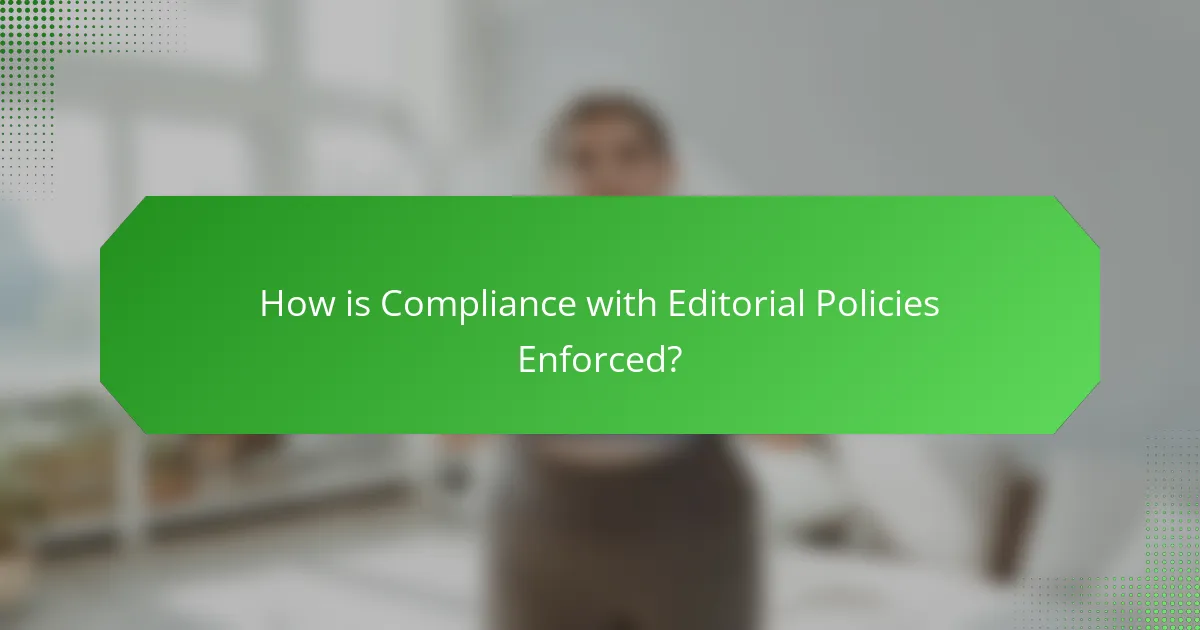
How is Compliance with Editorial Policies Enforced?
Compliance with editorial policies is enforced through a combination of oversight mechanisms and accountability measures. Editorial boards regularly review submitted content to ensure adherence to established guidelines. Peer review processes often include checks for policy compliance before publication. Violations may result in retraction of published work or disciplinary action against authors. Institutions may also implement training programs to educate authors on policy requirements. Monitoring tools and reporting systems can facilitate the identification of non-compliance. Regular audits of editorial practices help maintain standards. These measures collectively ensure that editorial policies are upheld effectively.
What mechanisms are in place for enforcing editorial policies?
Editorial policies are enforced through various mechanisms. These include regular audits of published content to ensure compliance. Peer review processes also play a critical role in maintaining standards. Editors are trained to identify and address violations of policies. There are established procedures for reporting unethical behavior. Consequences for violations can include retraction of articles. Transparency in the enforcement process is essential for credibility. Institutions often have dedicated committees to oversee compliance with editorial policies.
How do journals monitor adherence to these policies?
Journals monitor adherence to policies through various mechanisms. They implement peer review processes to evaluate submissions for compliance. Editors assess manuscripts against established ethical standards. Journals may use plagiarism detection software to ensure originality. They also require authors to disclose conflicts of interest. Regular audits of published articles help identify potential violations. Some journals maintain an open dialogue with authors regarding ethical concerns. Furthermore, adherence is often enforced through clear guidelines and consequences for non-compliance. These practices collectively ensure that publication ethics are upheld.
What role do peer reviews play in enforcing publication ethics?
Peer reviews are essential in enforcing publication ethics. They provide a critical evaluation of research before publication. This process ensures that work meets scholarly standards. Reviewers assess the validity, originality, and significance of the research. They also check for potential ethical violations, such as plagiarism or data fabrication. By identifying these issues, peer reviews help maintain integrity in the publication process. Studies show that rigorous peer review can reduce instances of unethical practices in academic publishing. Overall, peer reviews act as a safeguard for ethical standards in research dissemination.
What consequences arise from non-compliance with editorial policies?
Non-compliance with editorial policies can lead to severe consequences. These consequences include retraction of published articles. Retractions can damage the reputation of authors and journals. Non-compliance may also result in disciplinary actions against authors. Such actions can include bans from future submissions. Journals may face legal repercussions due to unethical practices. Additionally, trust in the publication can diminish among readers and researchers. This loss of trust can affect the journal’s impact factor and credibility. Overall, adherence to editorial policies is crucial for maintaining integrity in publishing.
How do institutions handle breaches of publication ethics?
Institutions handle breaches of publication ethics through established procedures. These procedures typically involve investigating the allegations thoroughly. Institutions often appoint a committee to review the case. The committee assesses the evidence and determines the validity of the claims. If a breach is confirmed, institutions may impose sanctions. Sanctions can include retraction of published works, formal reprimands, or bans on future submissions. Institutions also report serious breaches to relevant authorities or professional organizations. This approach ensures accountability and maintains the integrity of the publication process. Such measures are outlined in institutional policies on publication ethics.
What are the implications for authors found in violation of these policies?
Authors found in violation of editorial policies may face serious consequences. These consequences often include retraction of their published work. Violations can also lead to a ban from future submissions to the journal. Additionally, authors may experience damage to their professional reputation. In some cases, institutions may impose disciplinary actions against the authors. Violations can also affect co-authors, leading to broader repercussions. Many journals maintain a record of violations, which can impact future publication opportunities. These implications serve to uphold the integrity of the publication process.
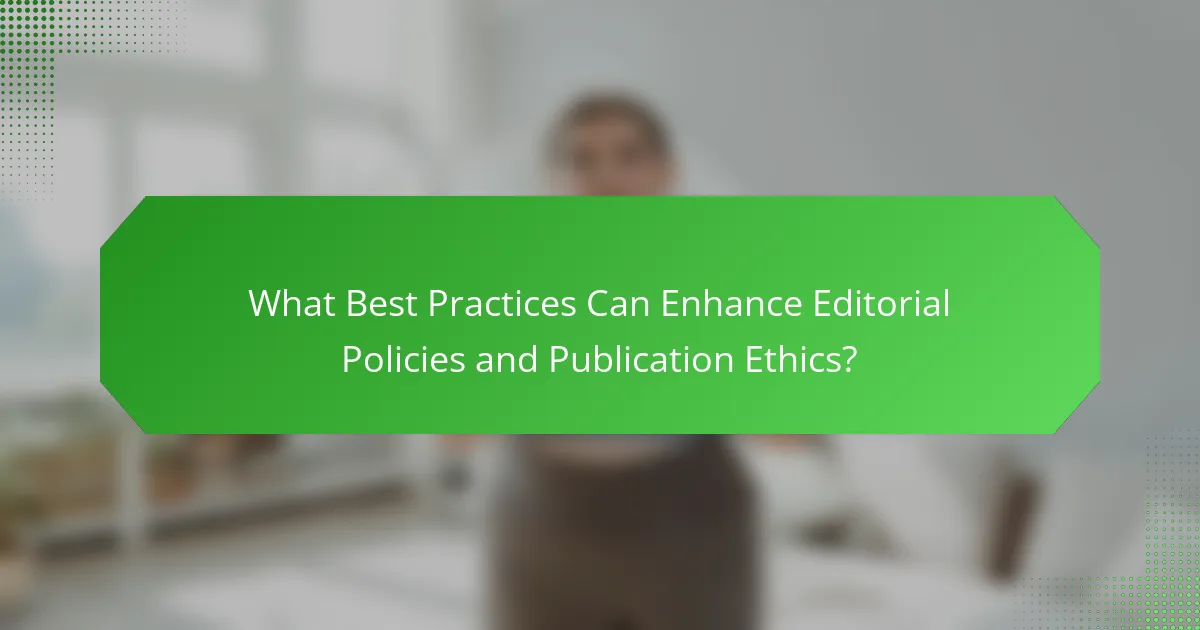
What Best Practices Can Enhance Editorial Policies and Publication Ethics?
Best practices that can enhance editorial policies and publication ethics include establishing clear guidelines for authors and reviewers. These guidelines should outline expectations for originality, transparency, and accountability. Journals should implement a robust peer review process to ensure the integrity of published research. This process can involve multiple reviewers to reduce bias and improve quality. Training editors and reviewers on ethical standards is essential for consistent enforcement of policies. Regular audits of published articles can help identify potential ethical breaches. Engaging with stakeholders, including authors and institutions, fosters a culture of ethical research practices. Finally, adopting open access policies can enhance transparency and accessibility in scholarly communication.
How can journals develop effective editorial policies?
Journals can develop effective editorial policies by clearly defining their scope and objectives. Establishing guidelines for manuscript submission is essential. These guidelines should include criteria for peer review and conflict of interest disclosures. Journals must also outline ethical standards for authors and reviewers. Regularly updating policies in response to evolving ethical standards is crucial. Engaging with stakeholders, including authors and reviewers, helps ensure relevance and comprehensiveness. Implementing training programs for editorial staff on ethical practices can enhance policy effectiveness. Monitoring compliance with these policies is necessary to maintain integrity in the publication process.
What steps should be taken to ensure policies are up-to-date?
Regularly review existing policies to identify outdated elements. Engage stakeholders for input on necessary updates. Monitor industry standards and best practices for relevance. Incorporate feedback from recent publications and ethical guidelines. Establish a schedule for periodic reviews, at least annually. Document changes and communicate updates clearly to all staff. Train staff on new policies to ensure compliance. Use data and case studies to inform policy adjustments.
How can stakeholder input improve editorial policy effectiveness?
Stakeholder input can enhance editorial policy effectiveness by incorporating diverse perspectives. This inclusion leads to more comprehensive policies that address the needs and concerns of various parties. Engaging stakeholders fosters transparency and builds trust in the editorial process. Research shows that diverse input can result in better decision-making and policy outcomes. For instance, a study by the National Academy of Sciences highlighted that stakeholder involvement improves the relevance and applicability of policies. This proactive engagement ultimately strengthens the integrity and ethical standards of publications.
What are some examples of successful editorial practices?
Successful editorial practices include implementing clear guidelines, maintaining transparency, and ensuring rigorous peer review. Clear guidelines help editors and authors understand expectations. Transparency in the editorial process builds trust with readers and contributors. Rigorous peer review ensures quality and integrity in published work. For instance, journals that disclose conflicts of interest have higher credibility. Additionally, editorial boards that regularly update their policies adapt to evolving ethical standards. Journals like Nature and The Lancet exemplify successful editorial practices through their strict adherence to these principles.
How do these practices foster a culture of ethical publishing?
These practices foster a culture of ethical publishing by establishing clear standards and expectations for authors and editors. They promote transparency in the publication process, ensuring that all contributors understand their responsibilities. By implementing rigorous peer review processes, they enhance the credibility and reliability of published work. Regular training and resources for editors and authors reinforce ethical standards. Additionally, these practices encourage accountability through mechanisms for reporting misconduct. Research indicates that journals with strict editorial policies report lower instances of unethical behavior. This creates an environment where integrity is valued and upheld in the publishing community.
What lessons can be learned from leading journals in enforcing publication ethics?
Leading journals emphasize the importance of transparency in publication ethics. They establish clear guidelines for authors and reviewers. These guidelines help prevent misconduct and promote integrity. Regular training for editorial staff is also a key lesson. It ensures that they are well-versed in ethical standards. Furthermore, leading journals often implement robust peer review processes. This helps in identifying potential ethical issues before publication. They also maintain open communication with authors regarding ethical concerns. This fosters a culture of accountability. Finally, leading journals actively update their policies in response to emerging ethical challenges. This adaptability is crucial for maintaining high ethical standards.
What practical tips can help authors navigate editorial policies?
Authors can navigate editorial policies by thoroughly reviewing the submission guidelines. Understanding the specific requirements of each journal is essential. Authors should also familiarize themselves with the journal’s ethical standards. This includes policies on plagiarism, authorship, and conflict of interest.
Engaging with the editorial team can provide clarity on ambiguous policies. Authors should not hesitate to ask questions regarding the submission process. Keeping detailed records of all correspondence is also advisable. This practice can help in case of disputes or misunderstandings.
Additionally, attending workshops or webinars on publication ethics can enhance understanding. Many journals offer resources and training for authors to better grasp their policies. Following these tips can significantly improve the chances of a successful submission.
The main entity of this article is editorial policies, which are formal guidelines that govern the content and practices of publications to uphold publication ethics. The article outlines the critical role of these policies in establishing ethical standards, ensuring transparency, and maintaining accountability among authors, editors, and reviewers. Key components discussed include guidelines for content creation, conflict resolution procedures, and mechanisms for enforcing compliance. Additionally, the article highlights best practices for enhancing editorial policies and addresses common ethical issues such as plagiarism and conflicts of interest. Overall, it emphasizes the importance of robust editorial policies in promoting integrity and trust in the scholarly communication process.
